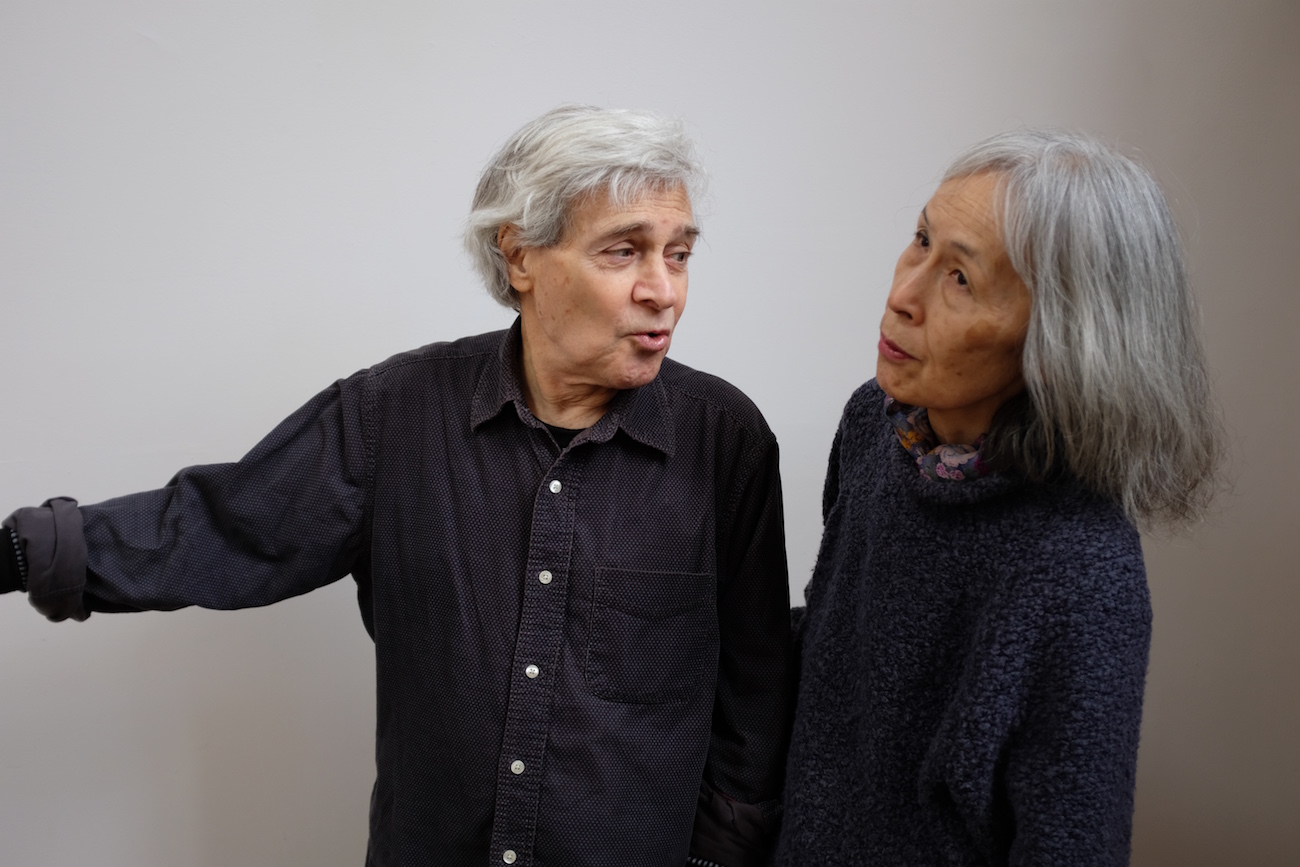[ad_1]
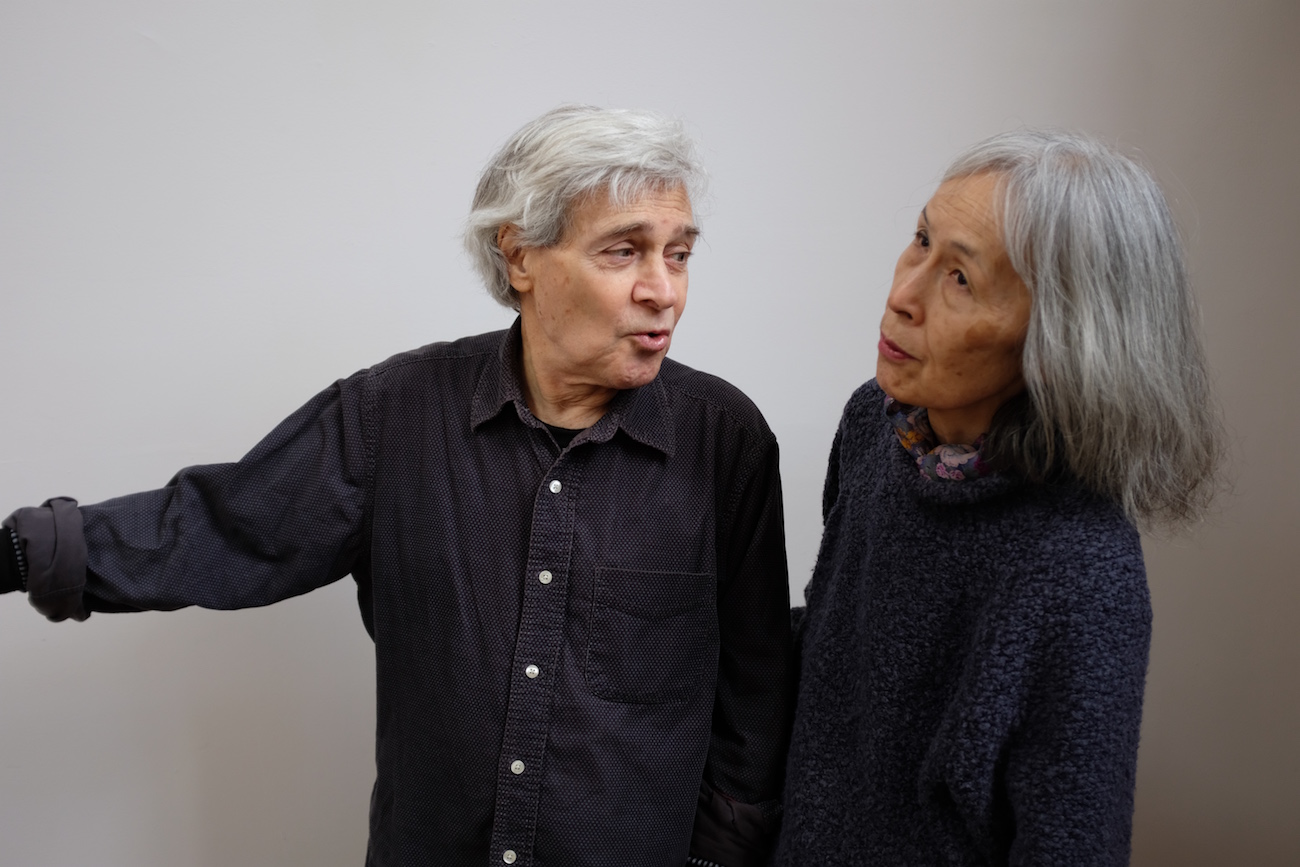
Steve Dalachinsky and Yuko Otomo at the Robert Rauschenberg Foundation in New York.
ANDREW LAMPERT
Steve Dalachinsky, a poet and paragon of particular strains of experimental music and art in New York City, died early Monday morning at the age of 72. The cause was a brain hemorrhage following a stroke after a reading in Long Island on Saturday—the same day he had taken in an ecstatic free-jazz concert by the Sun Ra Arkestra at James Cohan gallery in Tribeca.
Born in Brooklyn in 1946, Dalachinsky was the author of numerous books including A Superintendent’s Eyes, The Final Nite & Other Poems, and Where Night and Day Become One. He lived in SoHo with his wife, the painter and poet Yuko Otomo, and both were longtime fixtures at cultural happenings and gatherings of all kinds in Lower Manhattan and beyond. Dalachinsky was an important figure to many. Below, some of his colleagues and friends pay tribute. —Andy Battaglia
James Hoff
Artist, musician, co-founder of publisher Primary Information
Steve prided himself on being a consummate outsider and gathered all of us to help storm the gates. He and Yuko adopted so many of us, teaching us in the wings what we couldn’t learn in the books: the radical act of living life as an artist, a writer, or a musician in spite of a world that couldn’t care less. His prolific output as a poet, strewn across hundreds of small press publications, will one day be collected and absorbed and the world will realize what we all came to know: Steve held the keys to the gate all along. It’s hard to imagine New York City, downtown music, or poetry—all of which, in my mind, he changed forever—without him.
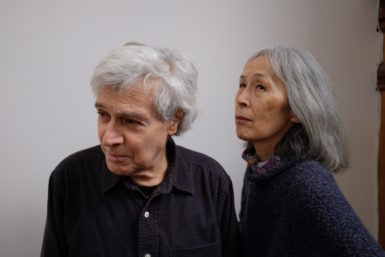
Steve Dalachinsky and Yuko Otomo at the Robert Rauschenberg Foundation in New York.
ANDREW LAMPERT
Matt Mottel
Musician, artist
In 1998, as a 17-year-old on the Upper West Side, I started my conscious absorption of downtown New York cultural history by meeting Steve Dalachinsky. He became my friend and collaborator for life. After gigs were over and the hang ended, we walked—often from Tonic to his stoop on Spring Street. We spoke the whole time with critiques and education from him about what we had just heard—a nightly moonlight university. Once the sun rose, down the street from his beatific apartment, he peddled rare records and books—a sidewalk hustle. I was there daily to learn and absorb with his chums from another planet: Rashied Ali, Tuli Kupferberg, his wife Yuko, an equal as a poet and artist. Steve Dalachinsky didn’t oxidize—he polished NYC street grit into a fine art. The world was his peer as he emasculated the gradations of hierarchy. The gravity of his orbit is eternal.
Fred Moten
Poet, theorist, jazz connoisseur
He was a really cool guy—open and generous and he loved, loved, loved the music, and made music of his own out of that love. It’s not gonna be the same without his generous presence and without his voice, which was loud and lyrical and absolute. It’s sudden, the sudden absence of the ubiquitous. He was always there at the music, and there for the music, and it makes you wonder how long this music is gonna last, you know. And when it goes, where and how will it disperse.
Jay Sanders
Executive director & chief curator of Artists Space
It’s impossible to put in words what the loss of Steve Dalachinsky means to his friends and to this city. Steve’s was one ongoing conversation, picked up night after night after night, that essentially centered the social body of experiencing things—ecstatic music and words particularly—together. His emphatic presence was just a given, so his absence now feels like the deepest aberration. Steve, happy new year. All our love forever.

Steve Dalachinsky and Yuko Otomo at the Robert Rauschenberg Foundation in New York.
ANDREW LAMPERT
Charlemagne Palestine
Artist, musician, idiosyncratic punctuator
As creaters like Woody Allen, Martin Scorcese, and Spike Lee are strongly New Yorkers in their styles of communication,,, Steve Dalachinsky was a Brooklyn New Yorker poet, artist, critic, and raconteur whose message of expression was universal but deeply rooted in his neighborhood’s language and atmosphere,,,, to see, hear, or discuss with Steve Dalachinsky was to also experience the flavors and odors of a Nitty Gritty New York that has more and more disappeared in the new globish diluted English language culture scene of today,,,, i, as many others,,, will sorely miss him,,, don’t rest in peace,,, Steve,,,, keep them on their toes and guessing,,, luvyuh man!!!
Julien Poirier
Poet and a founding member of Ugly Duckling Presse
I lived up on 112th Street and Steve and Yuko lived down in SoHo. On the weekends we would make plans to get brunch. I always came downtown. Steve wouldn’t be up any earlier than 11 and neither would I, and one reason for this is that we’d probably stayed up all night talking to each other on the phone. We would hang up at 4 in the morning and then I would take the C train down and meet him and Yuko around noon at a French bistro where we’d eat a big brunch with lots of coffee. On the phone we talked about nothing but poetry, obsessively, like mechanics working in the dark, but at brunch we talked about friends, movies, books, the scene. Steve once told me that the hardest thing he’d ever had to learn was how to live with his disgust for the behavior of his fellow man, but he did it: learned to accept what angered him without ever capitulating to it. He despaired, sometimes loudly, but his despair was so raw that you saw it springing from love. His love for what he loved was fierce and it filled his poetry with specific, truly loved things. Steve was a true poet and the greatest friend a younger poet could have. When it was time to say goodbye and he and Yuko and I were huddling together out on the sidewalk, he would grab me by the ears and smack me on the lips with his whiskery lips: “I love you, lad.”
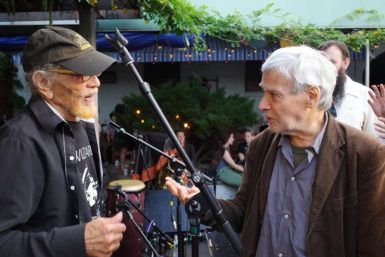
Steve Dalachinsky and Marshall Allen of the Sun Ra Arkestra at Union Pool in Brooklyn.
ANDREW LAMPERT
David Grubbs
Musician, writer, poet
For a long time Steve Dalachinsky was someone I recognized from gigs—sometimes it seemed like from every gig—and it was only after a number of years that I found myself finally gabbing with him. Once I got to know him, I wished I had done so earlier, because talking with Steve was always the easiest, most enlightening, most deeply enjoyable kind of potentially endless conversation. To say that he was passionate about music is a serious understatement. But he was also sharply discerning and completely frank, soulful, and wildly funny, and it hurts to know that we won’t cross paths again. I was always happy to see him read, I loved his duo with Loren Connors, and one of the things that I’ve been most looking forward to about this fall’s Cecil Taylor conference—”Unit Structures: The Art of Cecil Taylor” at Brooklyn College and the CUNY Graduate Center October 24-26—was the opportunity to hear Steve talk about Cecil’s music and poetry. I know of few people who could speak with such insight and modest authority—decades of thought and care—about their intertwining.
Clifford Allen
Jazz writer and director of archives at The Byrd Hoffman Water Mill Foundation
Steve Dalachinsky wrote about music and art the only way he knew how: from experience. As a poet he drew completely from wells of emotion and stark immediacy, paralleling the rawness of musicians’ work he intimately knew. Germs, phrases, rhythms, breaks, and responses in his writing play with and become music of his own—they jab percussively, interlace like chordal sinews, or act as their own soundscape when unaccompanied. His words are absolutely personal and often comic, a passionate mosaic blowing up a scene that often posits severity—words just like he lived. Whether observing from a seat near the back of The Stone or declaiming from a festival stage, his voice and ideas about the music he loved became collaborative.
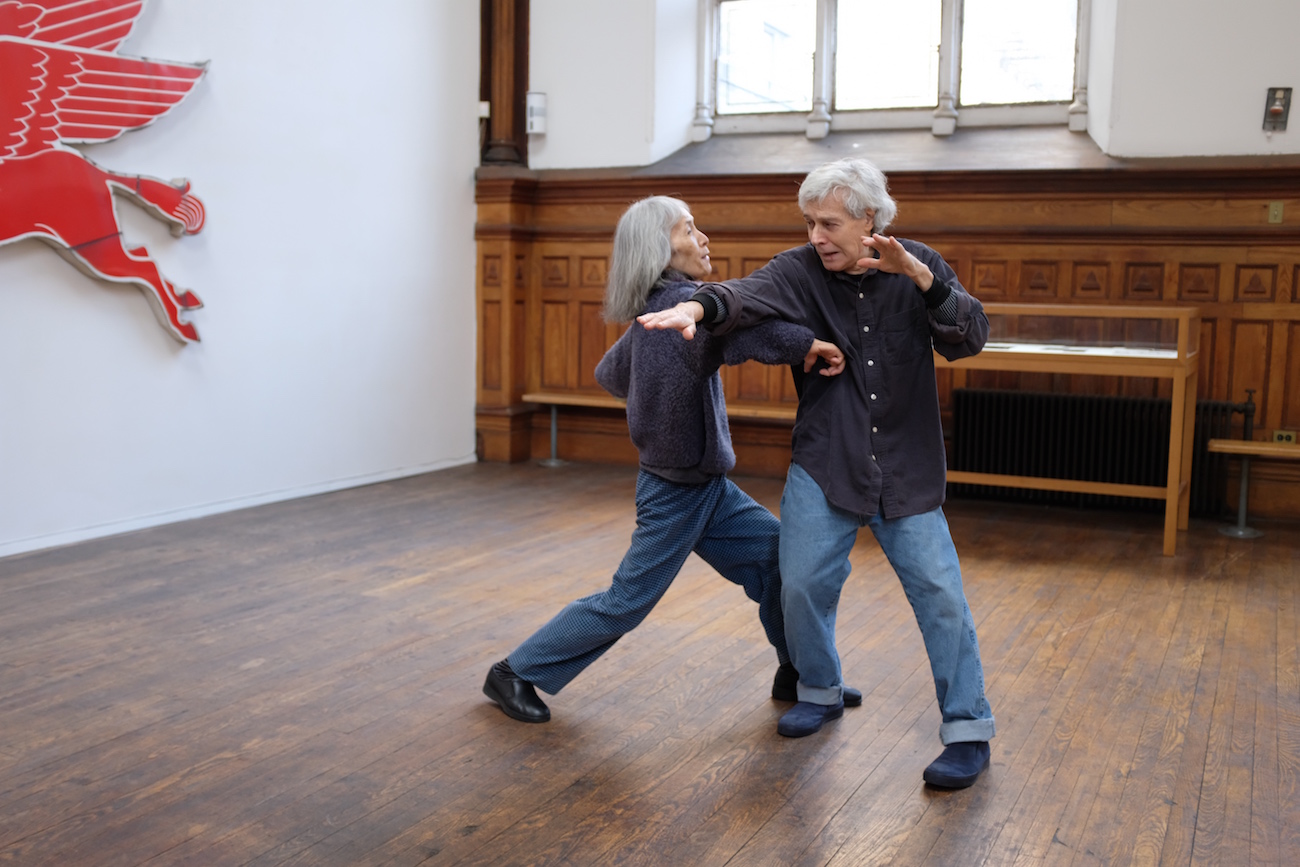
Steve Dalachinsky and Yuko Otomo at the Robert Rauschenberg Foundation in New York.
ANDREW LAMPERT
Andrew Lampert
Artist, archivist, co-founder of Chen & Lampert
Cranky, cantankerous, curmudgeon, wiseass—these and other usually objectionable words are being appropriately invoked as pluses rather than minuses in tributes to Steve Dalachinsky, a big-hearted and bigger-mouthed omnipresent poet, collagist, columnist, liner-note writer, street peddler, audience member, devoted listener, avid movie watcher, gallery-goer, matchmaker, truth teller, collaborator, conversationalist, beloved mooch, and best friend to more people than you’ve ever known. The ultimate downtowner who rhapsodized with an authentic Avenue J lilt from ye olde Brooklyn, Steve sounded like a 1950s yellow cab driver, but he was a thoroughly postmodern man. Even if you never spoke with him, you almost definitely overheard Steve hobnobbing with the door guy, ribbing other audience members, kvetching to the musicians, poets, and artists hanging backstage and in the room, hawking his merch, or even emceeing the show. His poetry and readings were always musical. How could they not be, given his obsessive, unwavering loyalty to music and musicians, sound itself, and more than that, language—on the page and in the air, in the ear and in your head. Steve and his wife Yuko (an indivisible duo, a human conjunction: SteveandYuko) always managed to turn their friends into family, and in doing so they made cousins of us all in our extended, amorphous community.
I read what I just wrote and it’s completely inadequate, almost stupid. What words can I express in the midst of processing such a deep shock? OK, this: Steve Dalachinsky was the kind of person you came to New York to meet.
Lawrence Kumpf
Founder and curator of Blank Forms
If you didn’t move to New York to live in a condo with a swimming pool on the roof and Trader Joe’s in the basement and instead thought it was an interesting place to hear music and poetry, drink too much, and take too many drugs, then you might have met Steve Dalachinsky. It’s difficult to say with any certainty that Steve was beloved by all, but he probably was by most. It’s hard to think of anyone who better personified a certain era in New York defined by independence, low stakes, and a fluid collaboration between art, music, and poetry—a way of being that is endangered as art and culture are increasingly becoming inaccessible and corporate. Steve and his wife Yuko lived in their tiny apartment in SoHo full of books and records. Through generosity, friendship, and poetry, they opened the doors for anyone who was willing to take the time. Steve didn’t pay for anything—he snuck into venues, got wasted after one drink, and got into arguments. He was emotional and deeply neurotic, always getting upset at his friends for not personally inviting him to something and for not doing this or that.
He also made art and poetry and went to everything he could—readings, concerts, and exhibitions—and supported his friends and community with his enthusiasm and dedication. Steve was on the scene, taking in the bits of culture that New York has to offer until the very last minute. He suffered a stroke just after giving a reading and on the heels of seeing Marshall Allen and the Sun Ra Arkestra perform earlier in the day. His last words were, “I think I overdosed on Sun Ra.” If Steve had told me that’s what he had said, I wouldn’t have believed it—but Yuko would never lie. If you’re pissed at him for not paying his way, you’re never going to get your $10: Dalachinsky is on the guest list for heaven now.
[ad_2]
Source link

